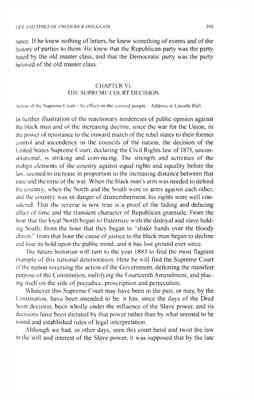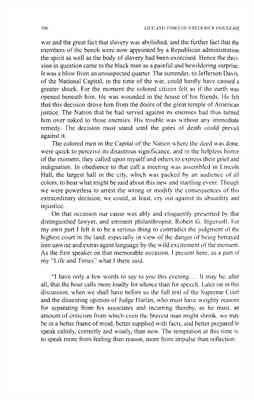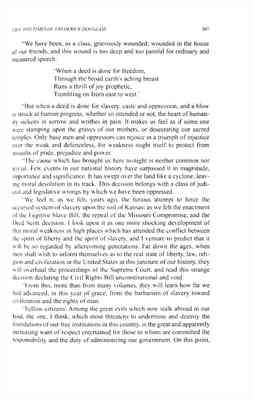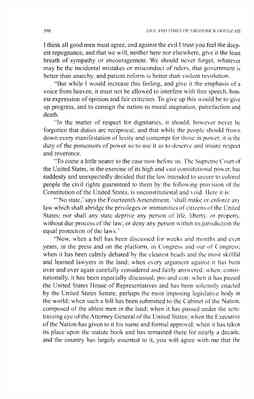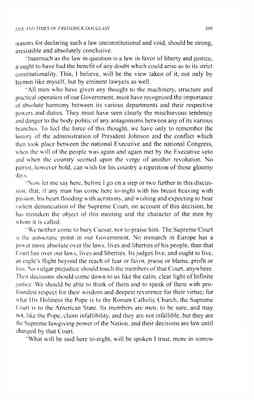Pages
21
LIFE AND TIMES OF FREDERICK DOUGLASS 395
[ignorance]. If he knew nothing of letters, he knew something of events and of the history of parties to them. He knew that the Republican party was the party hated by the old master class, and that the Democratic party was the party beloved of the old master class.
CHAPTER VI. THE SUPREME COURT DECISION.
Action of the Supreme Court – Its effect on the colored people – Address at Lincoln Hall.
In further illustration of the reactionary tendencies of public opinion against the black man and of the increasing decline, since the war for the Union, in the power of resistance to the onward march of the rebel states to their former control and ascendency in the councils of the nation, the decision of the United States Supreme Court, declaring the Civil Rights law of 1875, unconstitutional, is striking and convincing. The strength and activities of the malign clements of the country against equal rights and equality before the law, seemed to increase in proportion to the increasing distance between that time and the time of the war. When the black man's arm was needed to defend the country; when the North and the South were in arms against each other, and the country was in danger of dismemberment, his rights were well considered. That the reverse is now true is a proof of the fading and defacing effect of time and the transient character of Republican gratitude. From the hour that the loyal North began to fraternize with the disloyal and slave holding South; from the hour that they began to "'shake hands over the bloody chasm:" from that hour the cause of justice to the black man began to decline and lose its hold upon the public mind, and it has lost ground ever since.
The future historian will turn to the year 1883 to find the most flagrant example of this national deterioration. Here he will find the Supreme Court of the nation reversing the action of the Government, defeating the manifest purpose of the Constitution, nullifying the Fourteenth Amendment, and placing itself on the side of prejudice, proscription and persecution.
Whatever this Supreme Court may have been in the past, or may, by the Constitution, have been intended to be, it has, since the days of the Dred Scott decision, been wholly under the influence of the Slave power, and its decisions have been dictated by that power rather than by what seemed to be sound and established rules of legal interpretation.
Although we had, in other days, seen this court bend and twist the law to the will and interest of the Slave power, it was supposed that by the late
22
396 LIFE AND TIMES OF FREDERICK DOUGLASS
war and the great fact that slavery was abolished, and the further fact that the members of the bench were now appointed by a Republican administration the spirit as well as the body of slavery had been exorcised. Hence the decision in question came to the black man as a painful and bewildering surprise. It was a blow from an unsuspected quarter. The surrender, to Jefferson Davis, of the National Capital, in the time of the war, could hardly have caused a greater shock. For the moment the colored citizen felt as if the earth was opened beneath him. He was wounded in the house of his friends. He felt that this decision drove him from the doors of the great temple of American justice. The Nation that he had served against its enemies had thus turned him over naked to those enemies. His trouble was without any immediate remedy. The decision must stand until the gates of death could prevail against it.
The colored men in the Capital of the Nation where the deed was done, were quick to perceive its disastrous significance, and in the helpless horror of the moment, they called upon myself and others to express their grief and indignation. In obedience to that call a meeting was assembled in Lincoln Hall, the largest hall in the city, which was packed by an audience of all colors, to hear what might be said about this new and startling event. Though we were powerless to arrest the wrong or modify the consequences of this extraordinary decision, we could, at least cry out against its absurdity and injustice.
On that occasion our cause was ably and eloquently presented by that distinguished lawyer, and eminent philanthropist, Robert G. Ingersoll. For my own part I felt it to be a serious thing to contradict the judgment of the highest court in the land, especially in view of the danger of being betrayed into unwise and extravagant language by the wild excitement of the moment. As the first speaker on that memorable occasion, I present here, as a part of my "Life and Times" what I there said.
"I have only a few words to say to you this evening .... It may be, after all, that the hour calls more loudly for silence than for speech. Later on in this discussion, when we shall have before us the full text of the Supreme Court and the dissenting opinion of Judge Harlan, who must have weighty reasons for separating from his associates and incurring thereby, as he must, an amount of criticism from which even the bravest man might shrink, we may be in a better frame of mind, better supplied with facts, and better prepared to speak calmly, correctly and wisely, than now. The temptation at this time is, to speak more from feeling than reason, more from impulse than reflection.
23
LIFE AND TIME OF FREDERICK DOUGLASS 397
"We have been, as a class, grievously wounded; wounded in the house of our friends, and this wound is too deep and too painful for ordinary and measured speech.
'When a deed is done for freedom, Through the broad earth's aching breast Runs a thrill of joy prophetic, Trembling on from east to west.'
"But when a deed is done for slavery, caste and oppression, and a blow is struck at human progress, whether so intended or not, the heart of humanity sickens in sorrow and writhes in pain. It makes us feel as if some one were stamping upon the graves of our mothers, or desecrating our sacred temples. Only base men and oppressors can rejoice in a triumph of injustice over the weak and defenceless, for weakness ought itself to protect from assaults of pride, prejudice and power.
"The cause which has brought us here to-night is neither common nor trivial. Few events in our national history have surpassed it in magnitude, importance and significance. It has swept over the land like a cyclone, leaving moral desolation in its track. This decision belongs with a class of judicial and legislative wrongs by which we have been oppressed.
"We feel it, as we felt years ago, the furious attempt to force the accursed system of slavery upon the soil of Kansas: as we felt the enactment of the Fugitive Slave Hill: the repeal of the Missouri Compromise, and the Dred Scott decision. I look upon it as one more shocking development of that moral weakness in high places which has attended the conflict between the spirit of liberty and the spirit of slavery, and I venture to predict that it will be so regarded by aftercoming generations. Far down the ages, when men shall wish to inform themselves as to the real state of liberty, law, religion and civilization in the United States at this juncture of our history, they will overhaul the proceedings of the Supreme Court, and read this strange decision declaring the Civil Rights Bill unconstitutional and void.
"From this, more than from many volumes, they will learn how far we had advanced, in this year of grace, from the barbarism of slavery toward civilization and the rights of man.
"Fellow-citizens: Among the great evils which now stalk abroad in our land, the one, I think, which most threatens to undermine and destroy the foundations of our free institutions in this country, is the great and apparently increasing want of respect entertained for those to whom are committed the responsibility and the duty of administering our government. On this point,
24
398 LIFE AND TIMES OF FREDERICK DOUGLASS
I think all good men must agree, and against the evil I trust you feel the deepest repugnance, and that we will, neither here nor elsewhere, give it the least breath of sympathy or encouragement. We should never forget, whatever may be the incidental mistakes or misconduct of rulers, that government is better than anarchy, and patient reform is better than violent revolution.
"But while I would increase this feeling, and give it the emphasis of a voice from heaven, it must not be allowed to interfere with free speech, honest expression of opinion and fair criticism. To give up this would be to give up progress, and to consign the nation to moral stagnation, putrefaction and death.
"In the matter of respect for dignitaries, it should, however never be forgotten that duties are reciprocal, and that while the people should frown down every manifestation of levity and contempt for those in power, it is the duty of the possessors of power so to use it as to deserve and insure respect and reverence.
"To come a little nearer to the case now before us. The Supreme Court of the United States, in the exercise of its high and vast constitutional power, has suddenly and unexpectedly decided that the law intended to secure to colored people the civil rights guaranteed to them by the following provision of the Constitution of the United States, is unconstitutional and void. Here it is:
'"No state,' says the Fourteenth Amendment, 'shall make or enforce any law which shall abridge the privileges or immunities of citizens of the United States; nor shall any state deprive any person of life, liberty, or property, without due process of the law; or deny any person within its jurisdiction the equal protection of the laws.'
"Now, when a bill has been discussed for weeks and months and even years, in the press and on the platform, in Congress and out of Congress; when it has been calmly debated by the clearest heads and the most skillful and learned lawyers in the land; when every argument against it has been over and over again carefully considered and fairly answered; when, constitutionally, it has been especially discussed, pro and con; when it has passed the United States House of Representatives and has been solemnly enacted by the United States Senate, perhaps the most imposing legislative body in the world; when such a bill has been submitted to the Cabinet of the Nation, composed of the ablest men in the land; when it has passed under the scrutinizing eye of the Attorney General of the United States; when the Executive of the Nation has given to it his name and formal approval; when it has taken its place upon the statute book and has remained there for nearly a decade, and the country has largely assented to it, you will agree with me that the
25
LIFE AND TIMES OF FREDERICK DOUGLASS 399
reasons for declaring such a law unconstitutional and void, should be strong, irresistible and absolutely conclusive.
"Inasmuch as the law in question is a law in favor of liberty and justice, it ought to have had the benefit of any doubt which could arise as to its strict constitutionality. This, I believe, will be the view taken of it, not only by laymen like myself, but by eminent lawyers as well.
"All men who have given any thought to the machinery, structure and practical operation of our Government, must have recognized the importance of absolute harmony between its various departments and their respective powers and duties. They must have seen clearly the mischievous tendency and danger to the body politic of any antagonisms between any of its various branches. To feel the force of this thought, we have only to remember the history of the administration of President Johnson and the conflict which then took place between the national Executive and the national Congress, when the will of the people was again and again met by the Executive veto and when the country seemed upon the verge of another revolution. No patriot, however bold, can wish for his country a repetition of those gloomy days.
"Now let me say here, before I go on a step or two further in this discussion, that, if any man has come here to-night with his breast heaving with passion, his heart flooding with acrimony, and wishing and expecting to hear violent denunciation of the Supreme Court, on account of this decision, he has mistaken the object of this meeting and the character of the men by whom it is called.
"We neither come to bury Caesar, nor to praise him. The Supreme Court is the autocratic point in our Government. No monarch in Europe has a power more absolute over the laws, lives and liberties of his people, than that Court has over our laws, lives and liberties. Its judges live, and ought to live, an eagle's flight beyond the reach of fear or favor, praise or blame, profit or loss. No vulgar prejudice should touch the members of that Court, anywhere. Their decisions should come down to us like the calm, clear light of Infinite justice. We should be able to think of them and to speak of them with profoundest respect for their wisdom and deepest reverence for their virtue; for what His Holiness the Pope is to the Roman Catholic Church, the Supreme Court is to the American State. Its members are men, to be sure, and may not, like the Pope, claim infallibility, and they are not infallible, but they are the Supreme lawgiving power of the Nation, and their decisions are law until changed by that Court.
"What will be said here to-night, will be spoken I trust, more in sorrow
